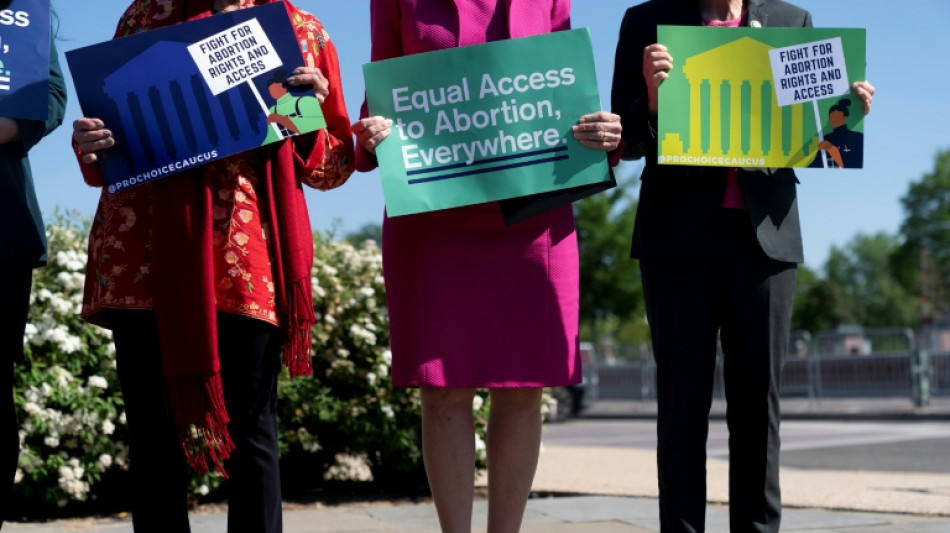
-
 Mane rescues AFCON draw for Senegal against DR Congo
Mane rescues AFCON draw for Senegal against DR Congo
-
Arsenal hold off surging Man City, Wirtz breaks Liverpool duck

-
 Arsenal ignore injury woes to retain top spot with win over Brighton
Arsenal ignore injury woes to retain top spot with win over Brighton
-
Sealed with a kiss: Guardiola revels in Cherki starring role

-
 UK launches paid military gap-year scheme amid recruitment struggles
UK launches paid military gap-year scheme amid recruitment struggles
-
Jota's children join tributes as Liverpool, Wolves pay respects

-
 'Tired' Inoue beats Picasso by unanimous decision to end gruelling year
'Tired' Inoue beats Picasso by unanimous decision to end gruelling year
-
Thailand and Cambodia declare truce after weeks of clashes

-
 Netanyahu to meet Trump in US on Monday
Netanyahu to meet Trump in US on Monday
-
US strikes targeted IS militants, Lakurawa jihadists, Nigeria says

-
 Cherki stars in Man City win at Forest
Cherki stars in Man City win at Forest
-
Schwarz records maiden super-G success, Odermatt fourth

-
 Russia pummels Kyiv ahead of Zelensky's US visit
Russia pummels Kyiv ahead of Zelensky's US visit
-
Smith laments lack of runs after first Ashes home Test loss for 15 years

-
 Russian barrage on Kyiv kills one, leaves hundreds of thousands without power
Russian barrage on Kyiv kills one, leaves hundreds of thousands without power
-
Stokes, Smith agree two-day Tests not a good look after MCG carnage

-
 Stokes hails under-fire England's courage in 'really special' Test win
Stokes hails under-fire England's courage in 'really special' Test win
-
What they said as England win 4th Ashes Test - reaction

-
 Hong Kongers bid farewell to 'king of umbrellas'
Hong Kongers bid farewell to 'king of umbrellas'
-
England snap 15-year losing streak to win chaotic 4th Ashes Test

-
 Thailand and Cambodia agree to 'immediate' ceasefire
Thailand and Cambodia agree to 'immediate' ceasefire
-
Closing 10-0 run lifts Bulls over 76ers while Pistons fall

-
 England 77-2 at tea, need 98 more to win chaotic 4th Ashes Test
England 77-2 at tea, need 98 more to win chaotic 4th Ashes Test
-
Somalia, African nations denounce Israeli recognition of Somaliland

-
 England need 175 to win chaotic 4th Ashes Test
England need 175 to win chaotic 4th Ashes Test
-
Cricket Australia boss says short Tests 'bad for business' after MCG carnage

-
 Russia lashes out at Zelensky ahead of new Trump talks on Ukraine plan
Russia lashes out at Zelensky ahead of new Trump talks on Ukraine plan
-
Six Australia wickets fall as England fight back in 4th Ashes Test

-
 Dental Implant Financing and Insurance Options in Georgetown, TX
Dental Implant Financing and Insurance Options in Georgetown, TX
-
Man Utd made to 'suffer' for Newcastle win, says Amorim

-
 Morocco made to wait for Cup of Nations knockout place after Egypt advance
Morocco made to wait for Cup of Nations knockout place after Egypt advance
-
Key NFL week has playoff spots, byes and seeds at stake

-
 Morocco forced to wait for AFCON knockout place after Mali draw
Morocco forced to wait for AFCON knockout place after Mali draw
-
Dorgu delivers winner for depleted Man Utd against Newcastle

-
 US stocks edge lower from records as precious metals surge
US stocks edge lower from records as precious metals surge
-
Somalia denounces Israeli recognition of Somaliland

-
 The Cure guitarist and keyboard player Perry Bamonte dies aged 65
The Cure guitarist and keyboard player Perry Bamonte dies aged 65
-
Draper to miss Australian Open

-
 Police arrest suspect after man stabs 3 women in Paris metro
Police arrest suspect after man stabs 3 women in Paris metro
-
Former Montpellier coach Gasset dies at 72

-
 Trump's Christmas gospel: bombs, blessings and blame
Trump's Christmas gospel: bombs, blessings and blame
-
Russia lashes out at Zelensky ahead of new Trump meeting on Ukraine plan

-
 Salah helps Egypt beat South Africa and book last-16 place
Salah helps Egypt beat South Africa and book last-16 place
-
Australia's Ikitau facing lengthy lay-off after shoulder injury

-
 Another 1,100 refugees cross into Mauritania from Mali: UN
Another 1,100 refugees cross into Mauritania from Mali: UN
-
Guardiola proud of Man City players' response to weighty issues

-
 Deadly blast hits mosque in Alawite area of Syria's Homs
Deadly blast hits mosque in Alawite area of Syria's Homs
-
The Jukebox Man on song as Redknapp records 'dream' King George win

-
 Liverpool boss Slot says Ekitike reaping rewards for greater physicality
Liverpool boss Slot says Ekitike reaping rewards for greater physicality
-
Judge jails ex-Malaysian PM Najib for 15 more years after new graft conviction


'Not based on science': US confronts abortion 'reversal' myths
Wracked by guilt after taking an abortion pill, a sobbing woman calls a US hotline. It recommends a "reversal" treatment to save the fetus -- despite medical warnings that it is potentially life-threatening.
Misinformation about medical termination appears to have skyrocketed since last June, when the Supreme Court overturned the landmark 1973 Roe v. Wade decision that guaranteed a constitutional right to abortion.
That includes false "pro-life" posts on social media claiming abortion pills cause cancer and infertility -- as well as "pro-choice" content promoting dubious herbal treatments to terminate a pregnancy.
More striking, researchers say, is a wave of misleading content that promotes an unscientific treatment that promises to undo the effects of the first pill, mifepristone, in the two-drug regimen for medical abortion.
Anti-abortion advocates in the United States have heralded the so-called "reversal" treatment -- which involves taking the hormone progesterone -- for women who change their minds after taking mifepristone.
"Abortion pill reversal can help turn back the clock," reads the website for the Abortion Pill Rescue Network (APRN), a pro-life outfit that supports the treatment.
"When destructive voices would only say 'it is done,' abortion pill reversal says 'here is a second chance at life, just in time.'"
APRN's website lists anecdotal "success stories" -- emotional testimonies from women who opted for the treatment. Some, including a single mother identified as Shashana, broke down after taking the first pill, consumed with regret.
She reached out to APRN's hotline that got her started on the "reversal" procedure that her written testimony says saved her fetus.
What is not mentioned is the warning from the American College of Obstetrics and Gynecologists (ACOG), an association of reproductive health specialists, that calls the treatment "unproven," "unethical" and "not based on science."
Also omitted is a 2019 medical trial by researchers from the University of California, Davis, to test the effectiveness of the "reversal" treatment. The trial had to be stopped prematurely after some participants experienced severe internal bleeding.
- 'Potential to harm' -
"The anecdotal 'success stories' often fail to acknowledge that there is no reputable medical evidence that taking progesterone to reverse the effects of mifepristone increases the likelihood of a pregnancy continuing," Anicka Slachta, a senior analyst at the watchdog NewsGuard, told AFP.
"Ultimately, omitting that context and presenting abortion pill 'reversal' as definitively safe and effective has the potential to cause harm."
When AFP requested APRN provide supporting data and interviews with the women cited under the "success stories," a publicist for Heartbeat International, an anti-abortion group that backs the network, replied.
She inquired what AFP's article intended to highlight but stopped responding thereafter.
When a US health misinformation researcher reached APRN's hotline posing as a pregnant woman, she was told the network had successfully saved 4,000 babies through the "reversal" treatment.
The hotline operator did not reveal the number of unsuccessful cases but mentioned a success rate of 64-68 percent, a statistic also cited on the network's website.
When the researcher -- who shared the audio recording with AFP -- pointed out that ACOG did not consider the treatment as safe, the operator dismissed the organization as "very pro-abortion," a stance that makes them "biased."
The operator said a prayer that she "make the right decision" -– that is, not carry out the abortion.
- 'Bodily autonomy' -
"What was clear in the call is that this group cares more about the life of the baby than the mother, point blank," the researcher told AFP, requesting anonymity for fear of online harassment.
"That was evident in the way they referred to the fetus but also through the omission of any real data about the risks."
In a report last week, the Center for Countering Digital Hate (CCDH) said thousands of "fake clinics" across the United States -- which seek to prevent "abortion-determined" people from accessing care -- collectively spent $10.2 million on Google search ads over the past two years.
Many of them, it said, promoted the "potentially dangerous" reversal procedure.
Research by the technology nonprofit Meedan Digital Health Lab shows that in the months after Roe v. Wade was overturned, online conversations about pill "reversals" were among three topics associated with abortion misinformation that saw a dramatic surge.
"It's not the idea of someone changing their mind on their own about having an abortion that's dangerous," Jenna Sherman, a program manager at the nonprofit, told AFP.
"It's pushing an unverified and potentially life-threatening intervention in an effort to be anti-abortion first and foremost over everything, rather than support people's bodily autonomy."
A.Jones--AMWN



